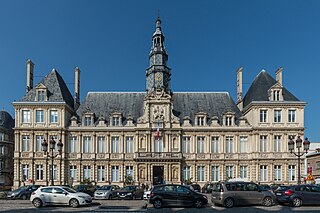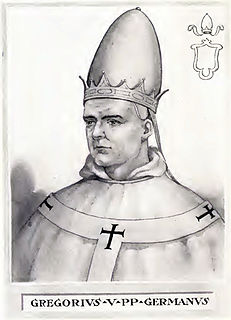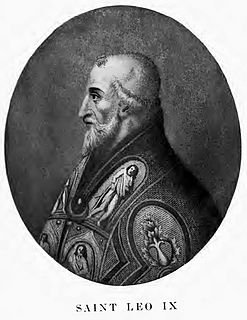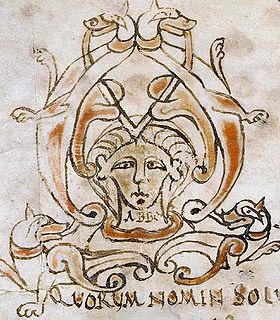Abbo (died 937) was the bishop of Soissons from 909. Throughout his episcopate, he was "under the thumb" of Count Herbert II of Vermandois (907–943).
Herbert II, Count of Vermandois, Count of Meaux, and Count of Soissons. He was the first to exercise power over the territory that became the province of Champagne.
In 925, Abbo attended the uncanonical synod convoked in Reims by Count Herbert, who had his five-year-old son Hugh elected archbishop by the pliant clergy (including Bishop Bovo of Châlons) and the people of the city. This synod was retroactively approved by both King Rudolph of France and Pope John X, who gave Herbert the administration of the archdiocese's temporalities and Abbo, technically Hugh's suffragan, responsibility for its spiritual functioning, including its services.

Reims, a city in the Grand Est region of France, lies 129 km (80 mi) east-northeast of Paris. The 2013 census recorded 182,592 inhabitants in the city of Reims proper, and 317,611 inhabitants in the metropolitan area. Its primary river, the Vesle, is a tributary of the Aisne.
Hugh of Vermandois was the Archbishop of Reims from 925 to 931, when he was removed from office by the actions of Hugh the Great and others, his father Herbert II, Count of Vermandois who had been the power behind his episcopate was driven out of Reims and the bishopric was then assumed by Artoldus.

Rudolph or Rudolf was the elected King of France from 923 until his death in 936. Prior to his election as king, he was Duke of Burgundy and Count of Troyes from 921. He was the son of Richard, Duke of Burgundy and Adelaide of Auxerre inheriting the Duchy of Burgundy from his father. He married Emma of France, daughter of king Robert I of France. He is frequently confused with his uncle Rudolph I of Burgundy.
In 927 the pope revoked Abbo's charge and gave the spiritual administration of Reims to Odalric, the bishop of Aix-en-Provence, who had fled his see in the face of raids from the Muslim pirates based at Fraxinetum.

Pope Agapetus II was Pope from 10 May 946 to his death in 955. A nominee of the Princeps of Rome, Alberic II, his pontificate occurred during the period known as the Saeculum obscurum.

Pope Gregory V, born Bruno of Carinthia was Pope from 3 May 996 to his death in 999.

Pope Stephen VIII was Pope from 14 July 939 to his death in 942.

Pope Leo IX, born Bruno of Egisheim-Dagsburg, was Pope from 12 February 1049 to his death in 1054. He was a German aristocrat and a powerful ruler of central Italy while holding the papacy. He is regarded as a saint by the Catholic Church, his feast day celebrated on 19 April.

Hugh Capet was the King of the Franks from 987 to 996. He is the founder and first king from the House of Capet. He was elected as the successor of the last Carolingian king, Louis V. Hugh was a descendant in illegitimate descent of Charlemagne through his mother and paternal grandmother.

Louis IV, called d'Outremer or Transmarinus, reigned as king of West Francia from 936 to 954. A member of the Carolingian dynasty, he was the only son of king Charles the Simple and his second wife Eadgifu of Wessex, daughter of King Edward the Elder of Wessex. His reign is mostly known thanks to the Annals of Flodoard and the later Historiae of Richerus.

Abbo or Abbon of Fleury, also known as Saint Abbo or Abbon, was a monk and abbot of Fleury Abbey in present-day Saint-Benoît-sur-Loire near Orléans, France.

Pope John X was Pope from March 914 to his death in 928. A candidate of the Counts of Tusculum, he attempted to unify Italy under the leadership of Berengar of Friuli, and was instrumental in the defeat of the Saracens at the Battle of Garigliano. He eventually fell out with Marozia, who had him deposed, imprisoned, and finally murdered. John’s pontificate occurred during the period known as the Saeculum obscurum.

Tilpin, whose name was corrupted in legend as Turpin, was the bishop of Reims from about 748 until his death. He was for many years regarded as the author of the legendary Historia Caroli Magni, which is thus also known as the "Pseudo-Turpin Chronicle". He appears as one of the Twelve Peers of France in a number of the chansons de geste, the most important of which is The Song of Roland. His portrayal in the chansons, often as a warrior-bishop, is completely fictitious.
Hugh (802–844) was the illegitimate son of Charlemagne and his concubine Regina, with whom he had one other son: Bishop Drogo of Metz (801–855). Along with Drogo and his illegitimate half-brother Theodoric, Hugh was tonsured and sent from the palace of Aachen to a monastery in 818 by his father's successor, Louis the Pious, following the revolt of King Bernard of Italy. Hugh rose to become abbot of several abbacies: Saint-Quentin (822/23), Lobbes (836), and Saint-Bertin (836). In 834, he was made imperial archchancellor by his half-brother.
Carloman was the youngest son of Charles the Bald, king of West Francia, and his first wife, Ermentrude. He was intended for an ecclesiastical career from an early age, but in 870 rebelled against his father and tried to claim a part of the kingdom as an inheritance.
Godfrey I, called the Prisoner or the Captive, sometimes the Old, was the count of Bidgau and Methingau from 959 and the count of Verdun from 963 to his death. In 969, he obtained the Margraviate of Antwerp and Ename. Between 974 and 998, he was also the count of Hainault and Mons.He was the son of Gozlin, Count of Bidgau and Methingau, and Oda of Metz. He was the brother of Adalberon, Archbishop of Reims, who crowned Hugh Capet the king of France.
Artald of Reims was twice Archbishop of Reims. He held the post first 931 to 940, when he was displaced by Hugh of Vermandois. He was restored, with the help of Louis IV of France, in 946.
Reims, located in the north-east of modern France, hosted several councils or synods in the Roman Catholic Church. These councils did not universally represent the church and are not counted among the official Ecumenical Councils.
Wala was a son of Bernard, son of Charles Martel, and one of the principal advisers of his cousin Charlemagne, of Charlemagne's son Louis the Pious, and of Louis's son Lothair I. He succeeded his brother Adalard as abbot of Corbie and its new daughter foundation, Corvey, in 826 or 827.

The Lateran Council of 769 was a synod held in the Basilica of St. John Lateran to rectify perceived abuses in the papal electoral process which had led to the elevation of the Antipopes Constantine II and Philip. It also condemned the rulings of the Council of Hieria. It is perhaps the most important Roman council held during the 8th century.
Wulfar or Wulfaire was the archbishop of Reims from 812 until his death. He was an important administrator in the Carolingian Empire, both before and during his episcopate, under the emperors Charlemagne and Louis the Pious.

Robert, also spelled Ruotbert or Rotbert, was the archbishop of Trier from 931 until his death. He played a leading role in the politics of both Germany and France, and especially of the Lotharingian territory in between. He was a patron of scholars and writers and a reformer of monasteries.












